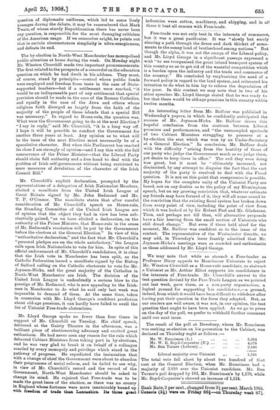An interesting letter from Mr. Balfour was published in Wednesday's
papers, in which he confidently anticipated the success of Mr. Joynson-Hicks. Mr. Balfour draws this hopeful conclusion from the contrast between Liberal promises and performances, and "the unexampled spectacle of two Cabinet Ministers struggling to preserve at a by-election the seat which was won by an Under-Secretary at a General Election." In conclusion, Mr. Balfour deals with the difficulty "arising from the hostility of those of our party who judge the Government much as we judge them, yet desire to keep them in office." The evil they were doing was great, but it must be "ultimately increased, not diminished, by any attempt to disguise the fact that the vast majority of the party is resolved to deal with the Fiscal question. It is not on this point that compromise is possible. My hopes for the complete unity of the Unionist Party are based, not on any doubts as to the policy of my Birmingham speech, but on my growing conviction that, whatever estimate my friends may have formed of it, they will all come round to the conviction that the existing fiscal system has broken down from every point of view, including the point of view from which it was looked at by Sir Robert Peel and Mr. Gladstone. Then, and perhaps not till then, will alternative proposals have a fair hearing from the small section of Unionists who still dread change." But even if these held aloof for the moment, Mr. Balfour was confident as to the issue of the contest. The representative of the Westminster Gazette, we may add, in Thursday's issue frankly admitted that Mr. Joynson-Hicks's meetings were as crowded and enthusiastic as those addressed by Mr. Lloyd George.






















































 Previous page
Previous page